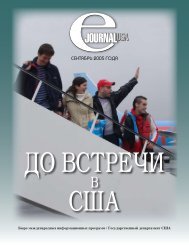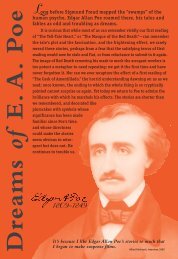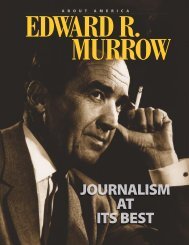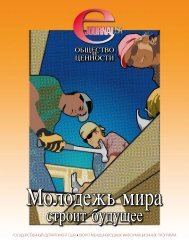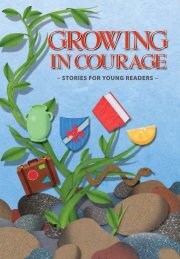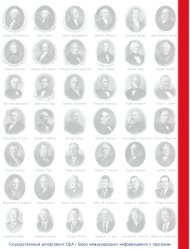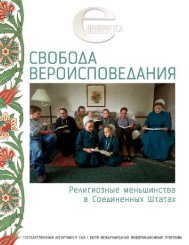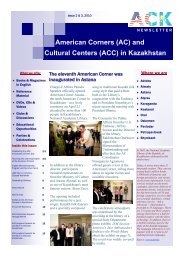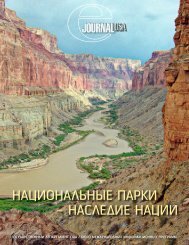AMERICAN
Outline of American Literature
Outline of American Literature
- No tags were found...
Create successful ePaper yourself
Turn your PDF publications into a flip-book with our unique Google optimized e-Paper software.
ground melody. It was experimental<br />
poetry, however, that gave Lowell his<br />
breakthrough into a creative individual<br />
idiom.<br />
On a reading tour in the mid-<br />
1950s, Lowell heard some of the new<br />
experimental poetry for the first<br />
time. Allen Ginsberg’s Howl and Gary<br />
Snyder’s Myths and Texts, still<br />
unpublished, were being read and<br />
chanted, sometimes to jazz accompaniment,<br />
in coffee houses in North<br />
Beach, a section of San Francisco.<br />
Lowell felt that next to these, his<br />
own accomplished poems were too<br />
stilted, rhetorical, and encased in<br />
convention; when reading them<br />
aloud, he made spontaneous revisions<br />
toward a more colloquial diction.<br />
“My own poems seemed like<br />
prehistoric monsters dragged down<br />
into a bog and death by their ponderous<br />
armor,” he wrote later. “I was<br />
reciting what I no longer felt.”<br />
At this point Lowell, like many<br />
poets after him, accepted the challenge<br />
of learning from the rival tradition<br />
in America — the school of<br />
William Carlos Williams. “It's as if no<br />
poet except Williams had really seen<br />
America or heard its language,”<br />
Lowell wrote in 1962. Henceforth,<br />
Lowell changed his writing drastically,<br />
using the “quick changes of tone,<br />
atmosphere, and speed” that Lowell<br />
most appreciated in Williams.<br />
Lowell dropped many of his<br />
obscure allusions; his rhymes<br />
became integral to the experience<br />
within the poem instead of superimposed<br />
on it. The stanzaic structure,<br />
too, collapsed; new improvisational<br />
forms arose. In Life Studies (1959),<br />
SYLVIA PLATH<br />
Photo © UPI / The Bettmann<br />
Archive<br />
he initiated confessional poetry, a<br />
new mode in which he bared his<br />
most tormenting personal problems<br />
with great honesty and intensity.<br />
In essence, he not only discovered<br />
his individuality but celebrated<br />
it in its most difficult and private<br />
manifestations. He transformed<br />
himself into a contemporary, at<br />
home with the self, the fragmentary,<br />
and the form as process.<br />
Lowell’s transformation, a watershed<br />
for poetry after the war,<br />
opened the way for many younger<br />
writers. In For the Union Dead<br />
(1964), Notebook 1967-68 (1969),<br />
and later books, he continued his<br />
autobiographical explorations and<br />
technical innovations, drawing upon<br />
his experience of psychoanalysis.<br />
Lowell’s confessional poetry has<br />
been particularly influential. Works<br />
by John Berryman, Anne Sexton,<br />
and Sylvia Plath (the last two his<br />
students), to mention only a few,<br />
are impossible to imagine without<br />
Lowell.<br />
IDIOSYNCRATIC POETS<br />
Poets who developed unique<br />
styles drawing on tradition<br />
but extending it into new<br />
realms with a distinctively contemporary<br />
flavor, in addition to Plath<br />
and Sexton, include John Berryman,<br />
Theodore Roethke, Richard Hugo,<br />
Philip Levine, James Dickey,<br />
Elizabeth Bishop, and Adrienne<br />
Rich.<br />
Sylvia Plath (1932-1963)<br />
Sylvia Plath lived an outwardly<br />
exemplary life, attending Smith<br />
82




